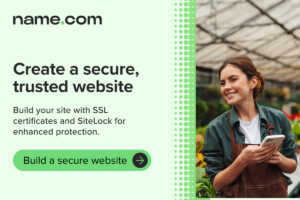
As a solopreneur, you might not think that you’ll be the target of hackers and cyber attackers. Surely criminals have bigger fish to fry, right?
Not necessarily. Small businesses lack the defenses of a larger company, and research reveals that in the last year, approximately one in four small business owners in the U.S. have been the target of a scam that leveraged generative AI to be more convincing.
Domain name security is table stakes for protecting your customers and your brand (you also have to ensure you’re not mistaken for a fraudster yourself). Here are three ways to boost your domain name protection and legitimacy in the market.
1. Fix security warnings
It’s a sure-fire way to lose potential customers: they click on your site, get redirected to a screen showing an exclamation mark in a triangle, and are warned that their information could be compromised if they proceed.
If you’ve ever found yourself asking, “Why does my site say ‘not secure?’” then you likely need an SSL certificate.
SSL — Secure Sockets Layer — is a global security standard. This domain protection ensures that the connection between your website’s server, your website’s traffic, and your customers’ browsers are encrypted so that confidential information, like credit card numbers, can be transmitted more safely.
With an SSL certificate, your website will have the secure “https” protocol rather than the generic “http”, which is good for your business — Google deprioritizes websites that don’t have an SSL certificate — and good for your customers’ peace of mind. Website builders such as Wix automatically install an SSL certificate, and their team of dedicated experts detect and respond to security matters so you can rest assured that your site, and your website visitors, are protected.
2. Proactively monitor security threats against your online brand
There’s no shortage of attack techniques that cybercriminals will try, especially when generative AI allows them to do so at speed and scale. It’s never been easier to make a convincing replica of a site, or to launch a series of fraudulent emails. Criminals send out an estimated 3.4 billion emails a day, and 36% of data breaches involve phishing. Multifactor authentication (MFA) — such as SMS- or email-based verification codes — and domain locks limit who can access your domains, and act as safeguards against these malicious attacks.
Domain privacy and protection is therefore essential for solopreneurs, but you may not have the time or resources to keep an eye out for threats — especially when they’re so numerous and sophisticated. For enhanced domain name protection, there are website security and domain protection services that can help detect and respond to vulnerabilities.
3. Invest in domain privacy and protection
Depending on the registrar you use for your website, all of the personal contact information you provided to register the domain — including your full name, address, email, and phone number — is posted on the WHOIS database in accordance with the policy set out by the Internet Corporation for Assigned Names and Numbers (ICANN). This is a public record, and since anyone has access, it can be a free-for-all for spammers and scammers.
If your registrar offers domain privacy protection, it ensures WHOIS displays its information instead of yours. This helps keep you safe from being targeted by spam or unsolicited phone calls and emails, as well as competitor espionage, identity theft, and domain hijacking.
So is domain protection worth it? Absolutely — for both you and your customers. With Name.com, you have the tools you need to enhance domain name security, keep your side hustle safe, and scale your business with confidence.